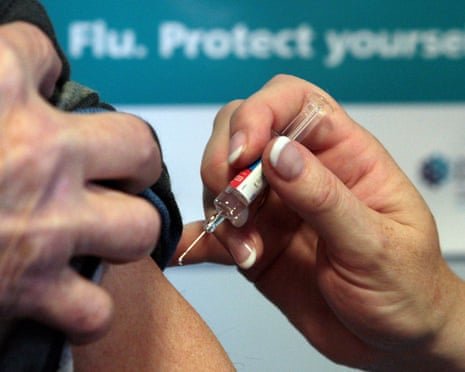
UK Braces for a Decade-Worst Flu Wave as Mutated H3N2 Strain Spreads Rapidly
Hospitals across Britain prepare for a surge in admissions as a highly transmissible flu variant triggers an unusually early season
Hospitals in the United Kingdom are preparing for what officials warn could be the most severe flu season in a decade, as a mutated version of the influenza A(H3N2) virus gains ground among younger people and threatens older patients next.
The variant is already driving a spike in infections and admissions, prompting renewed vaccination campaigns, contingency staffing plans and an urgent call for public action.
The variant, first detected in June and linked to the record-breaking flu wave in Australia this year, has rapidly become the dominant strain in the UK. Genetic analysis shows a cluster of mutations acquired through antigenic drift, which may help the virus evade prior immunity.
Experts estimate the reproduction number (R) for this season at around 1.4, compared to a typical 1.1-1.2, meaning the virus could spread significantly faster.
Public health leaders say the early start of the season, coupled with the transmissibility of the strain, means hospitals may face higher peaks than usual.
One executive nursing officer at a major London hospital group described last season as “particularly nasty” and said preparations have been scaled up for a “spike of flu on to our wards.” Meanwhile, the UK Health Security Agency reported that infections are highest in children but creeping into older age groups, and warned that the school half-term respite may not halt the advance of the virus.
The National Health Service (NHS) has adopted a number of mitigation measures: expanding same-day emergency care, increasing treatment in community settings, accelerating vaccinations for staff and eligible groups and drawing on extra consultants and re-scheduled appointments as doctors strike.
Health boards in Scotland, Wales and England are urging eligible individuals — including those aged over 65, pregnant women and people with long-term conditions — to get vaccinated without delay.
Early data suggests the current vaccine remains effective at reducing serious illness despite the strain mismatch.
In children, effectiveness against hospital attendance is estimated at 70-75 per cent, and in adults at 30-40 per cent.
However, uptake among high-risk groups remains concerningly low: fewer than a third of adults with long-term conditions had reported receiving the flu jab by early November.
As the wave gathers momentum, experts highlight the importance of early action.
Older adults, very young children, pregnant women and individuals with underlying health conditions face the highest risk of severe illness.
Virologists caution that the earlier onset of the season and rapid spread mean this flu wave could overwhelm parts of the health service more than recent years.
While uncertainty remains around how high the peak will climb, many analysts believe this season may eclipse previous years’ tolls if current trends continue.
Hospitals and public health teams are now operating under heightened alert as colder weather and increased indoor mixing create the conditions for the next wave of infections.
The variant is already driving a spike in infections and admissions, prompting renewed vaccination campaigns, contingency staffing plans and an urgent call for public action.
The variant, first detected in June and linked to the record-breaking flu wave in Australia this year, has rapidly become the dominant strain in the UK. Genetic analysis shows a cluster of mutations acquired through antigenic drift, which may help the virus evade prior immunity.
Experts estimate the reproduction number (R) for this season at around 1.4, compared to a typical 1.1-1.2, meaning the virus could spread significantly faster.
Public health leaders say the early start of the season, coupled with the transmissibility of the strain, means hospitals may face higher peaks than usual.
One executive nursing officer at a major London hospital group described last season as “particularly nasty” and said preparations have been scaled up for a “spike of flu on to our wards.” Meanwhile, the UK Health Security Agency reported that infections are highest in children but creeping into older age groups, and warned that the school half-term respite may not halt the advance of the virus.
The National Health Service (NHS) has adopted a number of mitigation measures: expanding same-day emergency care, increasing treatment in community settings, accelerating vaccinations for staff and eligible groups and drawing on extra consultants and re-scheduled appointments as doctors strike.
Health boards in Scotland, Wales and England are urging eligible individuals — including those aged over 65, pregnant women and people with long-term conditions — to get vaccinated without delay.
Early data suggests the current vaccine remains effective at reducing serious illness despite the strain mismatch.
In children, effectiveness against hospital attendance is estimated at 70-75 per cent, and in adults at 30-40 per cent.
However, uptake among high-risk groups remains concerningly low: fewer than a third of adults with long-term conditions had reported receiving the flu jab by early November.
As the wave gathers momentum, experts highlight the importance of early action.
Older adults, very young children, pregnant women and individuals with underlying health conditions face the highest risk of severe illness.
Virologists caution that the earlier onset of the season and rapid spread mean this flu wave could overwhelm parts of the health service more than recent years.
While uncertainty remains around how high the peak will climb, many analysts believe this season may eclipse previous years’ tolls if current trends continue.
Hospitals and public health teams are now operating under heightened alert as colder weather and increased indoor mixing create the conditions for the next wave of infections.









